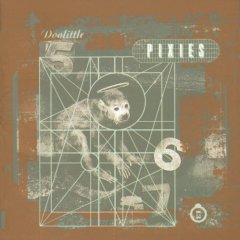 This is where I got well and truly on board with the Pixies' grand experiment in sound and rhythm. In retrospect, I think the friction between Black Francis and Mrs. John Murphy, here on the verge of boiling over into caustic and permanent damage to the band, probably made them better—certainly their ensuing solo and elsewise wandering afield careers show that the Pixies are vastly more than the sum of their parts, and it's a shame that everything after this was inferior to what came before. (Although, n.b., everything with the Pixies name attached is worthwhile and then some.) This is my favorite, and to put a point on it, I think "Monkey Gone to Heaven" is where everything comes together in a glorious and eternal 2:56 that stands up to repeated play and endless analysis, stoned or otherwise. Consider the deceptively nonsense lyrics of the final verse and chorus (aka "searing climax"): "if man is 5 (3x) / then the devil is 6 (5x) / then god is 7 (3x) / this monkey's gone to heaven." You can't overthink this, it just keeps deepening and deepening into itself, with man represented by the digits of one hand, the devil by the ancient lore of the number 6 (particularly when 3x, of course, but here presented 5x, effectively echoing the number of man), god by the same, viz., the number 7 (rhymes with heaven), in symmetrical relation 3x to man, underlined by a host of unholy shrieking. Then the monkey appears. The strings throughout are very nice too. This is amazing stuff.
This is where I got well and truly on board with the Pixies' grand experiment in sound and rhythm. In retrospect, I think the friction between Black Francis and Mrs. John Murphy, here on the verge of boiling over into caustic and permanent damage to the band, probably made them better—certainly their ensuing solo and elsewise wandering afield careers show that the Pixies are vastly more than the sum of their parts, and it's a shame that everything after this was inferior to what came before. (Although, n.b., everything with the Pixies name attached is worthwhile and then some.) This is my favorite, and to put a point on it, I think "Monkey Gone to Heaven" is where everything comes together in a glorious and eternal 2:56 that stands up to repeated play and endless analysis, stoned or otherwise. Consider the deceptively nonsense lyrics of the final verse and chorus (aka "searing climax"): "if man is 5 (3x) / then the devil is 6 (5x) / then god is 7 (3x) / this monkey's gone to heaven." You can't overthink this, it just keeps deepening and deepening into itself, with man represented by the digits of one hand, the devil by the ancient lore of the number 6 (particularly when 3x, of course, but here presented 5x, effectively echoing the number of man), god by the same, viz., the number 7 (rhymes with heaven), in symmetrical relation 3x to man, underlined by a host of unholy shrieking. Then the monkey appears. The strings throughout are very nice too. This is amazing stuff.
Thursday, November 22, 2007
Doolittle (1989)
 This is where I got well and truly on board with the Pixies' grand experiment in sound and rhythm. In retrospect, I think the friction between Black Francis and Mrs. John Murphy, here on the verge of boiling over into caustic and permanent damage to the band, probably made them better—certainly their ensuing solo and elsewise wandering afield careers show that the Pixies are vastly more than the sum of their parts, and it's a shame that everything after this was inferior to what came before. (Although, n.b., everything with the Pixies name attached is worthwhile and then some.) This is my favorite, and to put a point on it, I think "Monkey Gone to Heaven" is where everything comes together in a glorious and eternal 2:56 that stands up to repeated play and endless analysis, stoned or otherwise. Consider the deceptively nonsense lyrics of the final verse and chorus (aka "searing climax"): "if man is 5 (3x) / then the devil is 6 (5x) / then god is 7 (3x) / this monkey's gone to heaven." You can't overthink this, it just keeps deepening and deepening into itself, with man represented by the digits of one hand, the devil by the ancient lore of the number 6 (particularly when 3x, of course, but here presented 5x, effectively echoing the number of man), god by the same, viz., the number 7 (rhymes with heaven), in symmetrical relation 3x to man, underlined by a host of unholy shrieking. Then the monkey appears. The strings throughout are very nice too. This is amazing stuff.
This is where I got well and truly on board with the Pixies' grand experiment in sound and rhythm. In retrospect, I think the friction between Black Francis and Mrs. John Murphy, here on the verge of boiling over into caustic and permanent damage to the band, probably made them better—certainly their ensuing solo and elsewise wandering afield careers show that the Pixies are vastly more than the sum of their parts, and it's a shame that everything after this was inferior to what came before. (Although, n.b., everything with the Pixies name attached is worthwhile and then some.) This is my favorite, and to put a point on it, I think "Monkey Gone to Heaven" is where everything comes together in a glorious and eternal 2:56 that stands up to repeated play and endless analysis, stoned or otherwise. Consider the deceptively nonsense lyrics of the final verse and chorus (aka "searing climax"): "if man is 5 (3x) / then the devil is 6 (5x) / then god is 7 (3x) / this monkey's gone to heaven." You can't overthink this, it just keeps deepening and deepening into itself, with man represented by the digits of one hand, the devil by the ancient lore of the number 6 (particularly when 3x, of course, but here presented 5x, effectively echoing the number of man), god by the same, viz., the number 7 (rhymes with heaven), in symmetrical relation 3x to man, underlined by a host of unholy shrieking. Then the monkey appears. The strings throughout are very nice too. This is amazing stuff.
Tuesday, November 20, 2007
Surfer Rosa (1988)
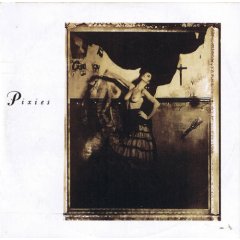 Enter Steve Albini, neither here nor there I suppose, but whose trademark brittle/sludgy mix with the drumkit persistently pushed to dominate all proceedings happened to make a neat fit with the Pixies, slipping into itself just as if it, the band, always belonged there, here, in this wild and gorgeous place. Because it did. The Pixies came from nowhere. Eventually they would hurtle back there. In between time, they made world-beating music like few others in or out of their time. They take it all the way down to a throbbing bass string and kick drum and Kim Deal's quavery vocal and all the way up to a wall of sound that tears apart your world and down again to Black Francis mumbling this or that ("where is my mind? where is my mind? where is my mind?") with a sour fuzzy guitar twang tracing him and then back up again to him shrieking and shrieking against the dense, pulsing, penetrable concretion. And the ghosts, haunting it all, the dogs barking and howling. The whole thing is practically organic. It worked in the studio, it worked on stage. It just plain worked. This is a first album? Enjoy it while you can because it's not going to last forever.
Enter Steve Albini, neither here nor there I suppose, but whose trademark brittle/sludgy mix with the drumkit persistently pushed to dominate all proceedings happened to make a neat fit with the Pixies, slipping into itself just as if it, the band, always belonged there, here, in this wild and gorgeous place. Because it did. The Pixies came from nowhere. Eventually they would hurtle back there. In between time, they made world-beating music like few others in or out of their time. They take it all the way down to a throbbing bass string and kick drum and Kim Deal's quavery vocal and all the way up to a wall of sound that tears apart your world and down again to Black Francis mumbling this or that ("where is my mind? where is my mind? where is my mind?") with a sour fuzzy guitar twang tracing him and then back up again to him shrieking and shrieking against the dense, pulsing, penetrable concretion. And the ghosts, haunting it all, the dogs barking and howling. The whole thing is practically organic. It worked in the studio, it worked on stage. It just plain worked. This is a first album? Enjoy it while you can because it's not going to last forever.
Sunday, November 18, 2007
Come On Pilgrim (1987)
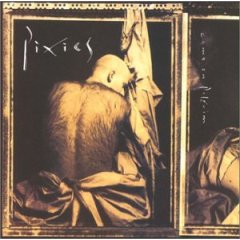 Damn fine debut EP from a band, the Pixies, that single-handedly refined and redirected "alternative" rock, doing everything but ridding of it the stupid label. Here's what we know: Black Francis (aka Frank Black, Charles Thompson IV) teams with Mrs. John Murphy (aka Kim Deal) to form a 2 guitars-bass-drums outfit. Most of their songs are short and feature a lot of caterwauling from the two principles, some of it in Spanish. The verses are often quiet, the choruses loud. When I say loud, I mean LOUD. As in deafening. The tunes are pretty good. The lyrics don't make much sense. The band is what's known as tight. Stand by for the next chapter in rock 'n' roll history.
Damn fine debut EP from a band, the Pixies, that single-handedly refined and redirected "alternative" rock, doing everything but ridding of it the stupid label. Here's what we know: Black Francis (aka Frank Black, Charles Thompson IV) teams with Mrs. John Murphy (aka Kim Deal) to form a 2 guitars-bass-drums outfit. Most of their songs are short and feature a lot of caterwauling from the two principles, some of it in Spanish. The verses are often quiet, the choruses loud. When I say loud, I mean LOUD. As in deafening. The tunes are pretty good. The lyrics don't make much sense. The band is what's known as tight. Stand by for the next chapter in rock 'n' roll history.
Remembering Satan: A Tragic Case of Recovered Memory (1994)
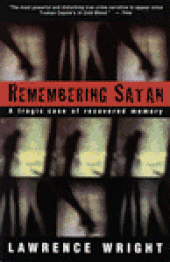 Fascinating true crime case from New Yorker writer Lawrence Wright—one of those vaguely creepy miscarriages of justice along the lines of what's seen in the documentary, Capturing the Friedmans, where it gets hard figuring out the good guys from the bad, and there's an undertowing urge to wish you'd never heard about any of it. In this book, Wright details the story of Olympia, Washington, sheriff's deputy and fundamentalist Christian Paul Ingram, whose teen daughters, on the basis of so-called recovered memories, accused him in 1988 of involvement with a Satanic cult, which physically and sexually abused them in ritual fashion. Their stories are unbelievably horrific—dismembered babies, gallons of blood, revolting sex, lots of chanting and finger cymbals. Not surprisingly, almost no physical or corroborative evidence supports their claims. Bizarrely, upon being arrested Ingram furrows his brow and starts recovering memories of his own. Near or shortly after the trial he finally came to his senses (as I read it) and recanted all. But too late. In the end he went to prison for well over a decade. The daughters have evidently never wavered. Those choosing to believe them over the father account for the lack of evidence Napoleon Dynamite style: "IDIOT! It's Satan. Of course he's going to get rid of the evidence." There's a cautionary tale in here somewhere.
Fascinating true crime case from New Yorker writer Lawrence Wright—one of those vaguely creepy miscarriages of justice along the lines of what's seen in the documentary, Capturing the Friedmans, where it gets hard figuring out the good guys from the bad, and there's an undertowing urge to wish you'd never heard about any of it. In this book, Wright details the story of Olympia, Washington, sheriff's deputy and fundamentalist Christian Paul Ingram, whose teen daughters, on the basis of so-called recovered memories, accused him in 1988 of involvement with a Satanic cult, which physically and sexually abused them in ritual fashion. Their stories are unbelievably horrific—dismembered babies, gallons of blood, revolting sex, lots of chanting and finger cymbals. Not surprisingly, almost no physical or corroborative evidence supports their claims. Bizarrely, upon being arrested Ingram furrows his brow and starts recovering memories of his own. Near or shortly after the trial he finally came to his senses (as I read it) and recanted all. But too late. In the end he went to prison for well over a decade. The daughters have evidently never wavered. Those choosing to believe them over the father account for the lack of evidence Napoleon Dynamite style: "IDIOT! It's Satan. Of course he's going to get rid of the evidence." There's a cautionary tale in here somewhere.In case it's not at the library
Thursday, November 15, 2007
Goo (1990)
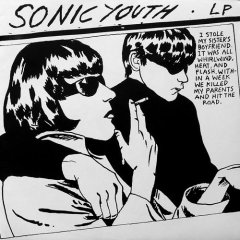 The much anticipated (and/or dreaded, depending on your point of view) major-label debut follow-up to Daydream Nation entered a worthy placeholder in the band's career. Obviously there was never going to be any corporate compromise/sellout going on here—there could not possibly be, given all that Thurston Moore & crew had at stake. Just as obviously, if only in hindsight, it was never going to be a match for the album before it. Not much could be. Disappointment, pleasure, relief—that was all in the eye of the beholder. I think it's pretty good. Spotty, maybe. But the sheets of noise are there. The melodies are still improving. The occasional jokes sharpening. It was brave enough given major-label expectations on all sides. And it still sounds pretty good. How many albums from 1990 can you say that about?
The much anticipated (and/or dreaded, depending on your point of view) major-label debut follow-up to Daydream Nation entered a worthy placeholder in the band's career. Obviously there was never going to be any corporate compromise/sellout going on here—there could not possibly be, given all that Thurston Moore & crew had at stake. Just as obviously, if only in hindsight, it was never going to be a match for the album before it. Not much could be. Disappointment, pleasure, relief—that was all in the eye of the beholder. I think it's pretty good. Spotty, maybe. But the sheets of noise are there. The melodies are still improving. The occasional jokes sharpening. It was brave enough given major-label expectations on all sides. And it still sounds pretty good. How many albums from 1990 can you say that about?
POTQ: Part of the Queue... Pocos días para la gran sorpresa!!!
Here's a music blog with all the right elements: frequent updates, interesting threads, variety, albums you want (don't miss the Imprescindibles series, which includes Serge Gainsbourg, DEVO, Transformer, Gorillaz, Manic Street Preachers, Janis Joplin, Cardigans, and Horses, and that's just recently), and an opportunity to practice new language skills. Goce!
See more great music blogs.
Tuesday, November 13, 2007
Daydream Nation (1988)
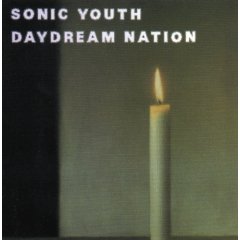 The best album that Sonic Youth ever made, one of the best albums of its time, kind of sneaked up on a lot of us—me, I know, for sure. They were an interesting sideshow, Thurston Moore with his big mouth and all that howling noise they brought and the strange tunings. Strictly small stage indie world. But then this, the bold double album with gatefold, and with that somnolent candle, carrying the kind of sounds that sink deep and somehow pack spiritual significance on the way. You can listen to this—loud, on headphones, for example, walking around the city at night—and after awhile the boundaries blur and you don't know where you end and the music begins or the dark and the sheets of noise and the pure physical sensation of it and your own breathing. They were starting to write songs, with melody even lyrics, but that's not what makes this work. That's something else, but suddenly the whole world unfolded open and the possibilities went all the way to the red horizon and beyond. Essential. That's what I'm trying to say.
The best album that Sonic Youth ever made, one of the best albums of its time, kind of sneaked up on a lot of us—me, I know, for sure. They were an interesting sideshow, Thurston Moore with his big mouth and all that howling noise they brought and the strange tunings. Strictly small stage indie world. But then this, the bold double album with gatefold, and with that somnolent candle, carrying the kind of sounds that sink deep and somehow pack spiritual significance on the way. You can listen to this—loud, on headphones, for example, walking around the city at night—and after awhile the boundaries blur and you don't know where you end and the music begins or the dark and the sheets of noise and the pure physical sensation of it and your own breathing. They were starting to write songs, with melody even lyrics, but that's not what makes this work. That's something else, but suddenly the whole world unfolded open and the possibilities went all the way to the red horizon and beyond. Essential. That's what I'm trying to say.
Sunday, November 11, 2007
The Innocent (1989)
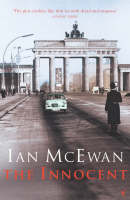 Ian McEwan's deceptively straightforward novel of love and intrigue in 1950s Cold War Berlin brilliantly drops chunks and slices of various genres into the blender and purees. As romance, its core, it's most effective, although that may be because its turn to horror is so surprising, unsettling, and ferociously unrelenting that the shock leaves one softened for human qualities—indeed, pathetically yearning for them. The appurtenances of spy novel, and rock 'n' roll coming of age tale, are there purely for the decoration, or the blessed distraction. Maybe because they're both Brits playing along the borders of cruelty and sexuality, McEwan here reminds me some of John Fowles. But underneath all the crisp pluck and cheeky diffidence, I get the sense there's more of a heart here than in anything from Fowles, and honestly, I don't have a single excuse for why I don't know more about McEwan's much more celebrated work. I'll have to get on that right away.
Ian McEwan's deceptively straightforward novel of love and intrigue in 1950s Cold War Berlin brilliantly drops chunks and slices of various genres into the blender and purees. As romance, its core, it's most effective, although that may be because its turn to horror is so surprising, unsettling, and ferociously unrelenting that the shock leaves one softened for human qualities—indeed, pathetically yearning for them. The appurtenances of spy novel, and rock 'n' roll coming of age tale, are there purely for the decoration, or the blessed distraction. Maybe because they're both Brits playing along the borders of cruelty and sexuality, McEwan here reminds me some of John Fowles. But underneath all the crisp pluck and cheeky diffidence, I get the sense there's more of a heart here than in anything from Fowles, and honestly, I don't have a single excuse for why I don't know more about McEwan's much more celebrated work. I'll have to get on that right away.In case it's not at the library.
Saturday, November 10, 2007
The Unboxed Set (1980-1988)
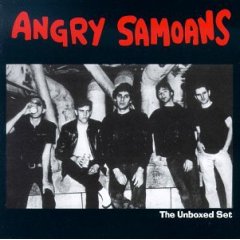 It's possible that the Angry Samoans are an acquired taste. But I wouldn't know about that. I liked them from the first time I saw them along about 1983 on an old episode of the USA Network's "Night Flight," razzing Peter Ivers unmercifully just before exploding into such fare as "Steak Knife" and "Todd Killings" (about murderer Skipper Todd: "He's killing time, Todd killings!"), all elbows and knees and grimacing blasts of sound. Shortly after that Peter Ivers was murdered, but I'm pretty sure that was just a coincidence. Maybe it's that I'm naturally partial to rock critic bands—I also like the Pet Shop Boys and Pretenders. The AS are very funny, mocking all the usual stuff (mediocrity, conformity, narrow-mindedness, etc., etc.), while celebrating all the usual stuff (psychotronic movies, their own natural yet criminally overlooked superiority, so on and so forth), all of it in ways that skate dangerously, disturbingly close to bad taste and worse. For example, do they hate homosexuals or do they hate homophobes? It's a pretty close call but I have to go with the latter, if only because that's what I want to believe. As ever, YMMV.
It's possible that the Angry Samoans are an acquired taste. But I wouldn't know about that. I liked them from the first time I saw them along about 1983 on an old episode of the USA Network's "Night Flight," razzing Peter Ivers unmercifully just before exploding into such fare as "Steak Knife" and "Todd Killings" (about murderer Skipper Todd: "He's killing time, Todd killings!"), all elbows and knees and grimacing blasts of sound. Shortly after that Peter Ivers was murdered, but I'm pretty sure that was just a coincidence. Maybe it's that I'm naturally partial to rock critic bands—I also like the Pet Shop Boys and Pretenders. The AS are very funny, mocking all the usual stuff (mediocrity, conformity, narrow-mindedness, etc., etc.), while celebrating all the usual stuff (psychotronic movies, their own natural yet criminally overlooked superiority, so on and so forth), all of it in ways that skate dangerously, disturbingly close to bad taste and worse. For example, do they hate homosexuals or do they hate homophobes? It's a pretty close call but I have to go with the latter, if only because that's what I want to believe. As ever, YMMV.
Wednesday, November 07, 2007
Hungry for Stink (1994)
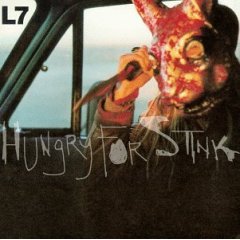 L7 calls this rut a groove and goes with it. The only difference from its immediate predecessor, and kind of a shame into the bargain, is that the mix too often swallows the vocals. But then, the lyrics this time are several clicks of the dial darker: rage about to detonate, the vulnerable followed down dark streets, baggage that drowns, depression gone too far ("the paint chips are kicking in"), and TVs broadcasting personalized messages. "I'm good at feeling bad I'm even better at feeling worse." I suppose it's not really fare for the weak of spirit. But feel it: the punk is punker, the heavy is heavier, and the metal metaller. Don't miss the throbbing cellos on "Can I Run." Those wanting a straight jolt of rock 'n' roll are referred to "Riding With a Movie Star." Headbangers of all stripes, down your antidepressants and start your engines. This one goes all laps.
L7 calls this rut a groove and goes with it. The only difference from its immediate predecessor, and kind of a shame into the bargain, is that the mix too often swallows the vocals. But then, the lyrics this time are several clicks of the dial darker: rage about to detonate, the vulnerable followed down dark streets, baggage that drowns, depression gone too far ("the paint chips are kicking in"), and TVs broadcasting personalized messages. "I'm good at feeling bad I'm even better at feeling worse." I suppose it's not really fare for the weak of spirit. But feel it: the punk is punker, the heavy is heavier, and the metal metaller. Don't miss the throbbing cellos on "Can I Run." Those wanting a straight jolt of rock 'n' roll are referred to "Riding With a Movie Star." Headbangers of all stripes, down your antidepressants and start your engines. This one goes all laps.
Monday, November 05, 2007
Bricks Are Heavy (1992)
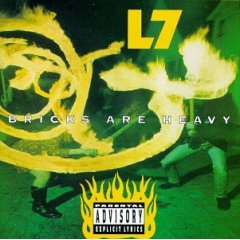 This is way better than you know, in case you've never heard it. These four gals from Los Angeles were pissed off plus along about the time of the first Iraq War (imagine how they feel now), possessed of all the requisite cool to translate that into music that thunders and breathes pure fire. Because it is so deft and accomplished at pulling together elements of metal (the big big bottom, the sparkling Eddie Van Halen guitar flourishes) with elements of punk (all attitude all the time), and also maybe because Butch Vig helms this one, the label most often applied is "grunge." Well, whatever. Every track here comes on like bulldozers, rife with nifty melody, groovy vocal interplay, sharp biting references, and hilarious lyrical strategies ("My diet pill is wearing off"). A total winner.
This is way better than you know, in case you've never heard it. These four gals from Los Angeles were pissed off plus along about the time of the first Iraq War (imagine how they feel now), possessed of all the requisite cool to translate that into music that thunders and breathes pure fire. Because it is so deft and accomplished at pulling together elements of metal (the big big bottom, the sparkling Eddie Van Halen guitar flourishes) with elements of punk (all attitude all the time), and also maybe because Butch Vig helms this one, the label most often applied is "grunge." Well, whatever. Every track here comes on like bulldozers, rife with nifty melody, groovy vocal interplay, sharp biting references, and hilarious lyrical strategies ("My diet pill is wearing off"). A total winner.
Sunday, November 04, 2007
Shot in the Heart (1994)
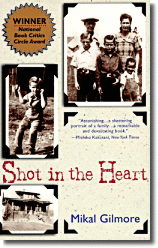 Mikal Gilmore you might know as one of the team of virtually interchangeable, somewhat oddly named rock critics who have toiled in and out of the vineyards of Rolling Stone since the '80s—contemporary with Parke Puterbaugh, J.D. Considine, David Fricke, Anthony De Curtis, Kurt Loder. Or you might know Mikal Gilmore as the youngest brother of Gary Gilmore, convicted and executed Utah murderer and star of Norman Mailer's impressive The Executioner's Song. In this riveting memoir, Mikal Gilmore tells the story of his family, his brother, and himself, simply, starkly, harrowingly, and without a shred of self-pity. To say it's remarkable does not come close to doing it justice. Without a doubt this is one of the best American memoirs ever written.
Mikal Gilmore you might know as one of the team of virtually interchangeable, somewhat oddly named rock critics who have toiled in and out of the vineyards of Rolling Stone since the '80s—contemporary with Parke Puterbaugh, J.D. Considine, David Fricke, Anthony De Curtis, Kurt Loder. Or you might know Mikal Gilmore as the youngest brother of Gary Gilmore, convicted and executed Utah murderer and star of Norman Mailer's impressive The Executioner's Song. In this riveting memoir, Mikal Gilmore tells the story of his family, his brother, and himself, simply, starkly, harrowingly, and without a shred of self-pity. To say it's remarkable does not come close to doing it justice. Without a doubt this is one of the best American memoirs ever written.In case it's not at the library.
Friday, November 02, 2007
Tupelo Honey (1971)
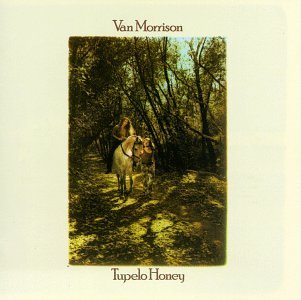 "You're My Woman" A more worthy follow-up to Moondance than the two immediately before and after this (His Band and the Street Choir and Saint Dominic's Preview), this one might also mark a point where agreements about Van Morrison begin to splinter. I think he's at his best when he sweetens the sauce and lets the music sparkle, holding the line on the longer workouts, which often—not always—drift toward self-indulgence (cf., "Listen to the Lion" on Dominic's). That's exactly what he's done here. Featuring career highwater marks in both "Wild Night" and "You're My Woman," nothing here is less than perfectly fine. The band boasts that Van Morrison specialty of playing both tight and loose all at once (how do they do that?), the tunes are exquisite, the chick singers fantastic, the harpsichord once again works, and the feeling throughout is warm, tender, and sweet. A good one.
"You're My Woman" A more worthy follow-up to Moondance than the two immediately before and after this (His Band and the Street Choir and Saint Dominic's Preview), this one might also mark a point where agreements about Van Morrison begin to splinter. I think he's at his best when he sweetens the sauce and lets the music sparkle, holding the line on the longer workouts, which often—not always—drift toward self-indulgence (cf., "Listen to the Lion" on Dominic's). That's exactly what he's done here. Featuring career highwater marks in both "Wild Night" and "You're My Woman," nothing here is less than perfectly fine. The band boasts that Van Morrison specialty of playing both tight and loose all at once (how do they do that?), the tunes are exquisite, the chick singers fantastic, the harpsichord once again works, and the feeling throughout is warm, tender, and sweet. A good one.Thursday, November 01, 2007
PunchDrunk
Proprietor Robert.Johnsson posts almost as sporadically to his blog as he does so generously, favoring discographies (or near discographies) of various punk and related artists: Mono Men, Ministry, Celibate Rifles, Imperiet, Ramones, Ed Kuepper, Saints, so on and so forth. Lots of great, handpicked individual titles as well. Understandably, he is annoyed and discouraged by trolls. But he works very hard at making this one of the most worthwhile of stops on your travels, continually taking time to re-up deleted titles and respond to requests. He deserves your support and kind words, and by the way, don't sign off as "Anonymous" when you do. Full albums available indefinitely. Archives worth browsing.
See more great music blogs.
Tuesday, October 30, 2007
Chunga's Revenge (1970)
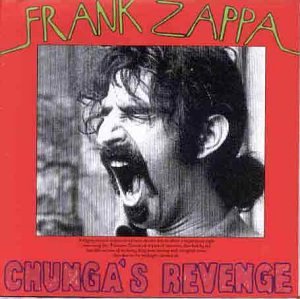 If not a hurry-up job to get something on the market, for whatever reason, this at least is some kind of transitional job. Resembling its predecessor Weasels Ripped My Flesh more than Frank Zappa's first official solo, Hot Rats, but neither so much like any of the Mothers albums from the '60s. Which is to say it's something of a pastiche but without much effort to tie the pieces together. So take it in the pieces offered: Zappa's fine guitar showcase on "Transylvania Boogie," the introduction of Flo & Eddie to the Mothers family, a brief nod to Zappa the nuanced composer on the brief "Twenty Small Cigars," the usual lame jokes about groupies and the rock 'n' roll life, snorts, belches, and hey, that's my old friend Peter getting one in off rhythm on the live section of "The Nancy and Mary Music," recorded at the Guthrie Theater in Minneapolis, Minnesota, with audience participation. Good going, Peter!
If not a hurry-up job to get something on the market, for whatever reason, this at least is some kind of transitional job. Resembling its predecessor Weasels Ripped My Flesh more than Frank Zappa's first official solo, Hot Rats, but neither so much like any of the Mothers albums from the '60s. Which is to say it's something of a pastiche but without much effort to tie the pieces together. So take it in the pieces offered: Zappa's fine guitar showcase on "Transylvania Boogie," the introduction of Flo & Eddie to the Mothers family, a brief nod to Zappa the nuanced composer on the brief "Twenty Small Cigars," the usual lame jokes about groupies and the rock 'n' roll life, snorts, belches, and hey, that's my old friend Peter getting one in off rhythm on the live section of "The Nancy and Mary Music," recorded at the Guthrie Theater in Minneapolis, Minnesota, with audience participation. Good going, Peter!
Sunday, October 28, 2007
Going Native (1994)
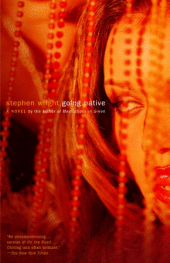 This very strange novel by Stephen Wright—hollow at its core, infinitely detailed at its edges—attacks with a strategy as baffling as it is compulsively readable. The main character stalks the action in a series of perfunctory cameos, flickeringly, almost not there at all, his name, even his appearance, constantly changing. He is on his way out of each scene even at it opens, yet each section is developed with the studious attention of observing the petals of a flower open in the summer sunshine of a brilliant day in July: the usual suburban America, vicious annals of true crime, tawdry sex of a certain stink, street drugs, dark rooms, sensational movie rentals, lonely truck drivers, sleeping under bridges, hitchhiking at the crack of dawn, rundown motels of course (you could have predicted that), mixed-up kids, grungy cops and doughnut jokes, screenplays in progress, depressed women, always the TV on, shades of gray and streaks of yellow. Don't pay any attention to the comparisons with On the Road. This is way beyond Jack Kerouac.
This very strange novel by Stephen Wright—hollow at its core, infinitely detailed at its edges—attacks with a strategy as baffling as it is compulsively readable. The main character stalks the action in a series of perfunctory cameos, flickeringly, almost not there at all, his name, even his appearance, constantly changing. He is on his way out of each scene even at it opens, yet each section is developed with the studious attention of observing the petals of a flower open in the summer sunshine of a brilliant day in July: the usual suburban America, vicious annals of true crime, tawdry sex of a certain stink, street drugs, dark rooms, sensational movie rentals, lonely truck drivers, sleeping under bridges, hitchhiking at the crack of dawn, rundown motels of course (you could have predicted that), mixed-up kids, grungy cops and doughnut jokes, screenplays in progress, depressed women, always the TV on, shades of gray and streaks of yellow. Don't pay any attention to the comparisons with On the Road. This is way beyond Jack Kerouac.In case it's not at the library.
Saturday, October 27, 2007
TV Eye Live 1977 (1978)
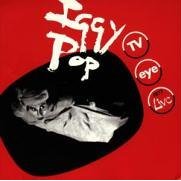 The story on this is that Iggy the Pop, at or nearing the peak of his post-LA/heroin comeback, released this as a throwaway to get out of a contract with RCA. With eight tracks from three midwestern venues on his 1977 travels, the whole thing clocking in at less than 40 minutes, it's routinely derided as possessed of less than bootleg quality. So caveat emptor and all that. Me, I think it's a bracing tonic and welcome sidebar to the Bowie-ized songsmithery of the first two RCA albums, also from 1977, The Idiot and Lust for Life. Heaven knows, I think they are both very fine albums, certainly among his best; unlike Raw Power, Bowie's input is purely beneficial. But they are missing the crucial elements of Iggy the Stooge, sludge driven slayer of planets, whose rhythm sections and guitars bludgeon all in their path. That's what you find here. Play very loud. (Or find actual bootlegs from his travels that year and do exactly the same. Word is that some have "better sound.")
The story on this is that Iggy the Pop, at or nearing the peak of his post-LA/heroin comeback, released this as a throwaway to get out of a contract with RCA. With eight tracks from three midwestern venues on his 1977 travels, the whole thing clocking in at less than 40 minutes, it's routinely derided as possessed of less than bootleg quality. So caveat emptor and all that. Me, I think it's a bracing tonic and welcome sidebar to the Bowie-ized songsmithery of the first two RCA albums, also from 1977, The Idiot and Lust for Life. Heaven knows, I think they are both very fine albums, certainly among his best; unlike Raw Power, Bowie's input is purely beneficial. But they are missing the crucial elements of Iggy the Stooge, sludge driven slayer of planets, whose rhythm sections and guitars bludgeon all in their path. That's what you find here. Play very loud. (Or find actual bootlegs from his travels that year and do exactly the same. Word is that some have "better sound.")
Wednesday, October 24, 2007
Them (1965)
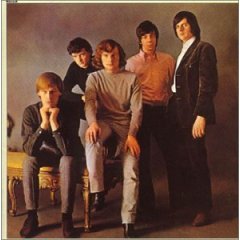 Anyone who might think that Van Morrison is more an artifact and purveyor of '70s post-folk singer/songwriter gentle on my mind fare (not that there's anything wrong with that) is referred directly to this mid-'60s debut of his Belfast band. "Gloria" alone, an instant standard for garage bands worldwide, should answer any further questions, but the yowling kick of the rest is all the way up to that classic and not to be missed. Comparable to early Bruce Springsteen and much of Patti Smith (both clearly influenced by Morrison and Them) in its full-on, breathtaking immersion in tumbling blasts of language—Bob Dylan is somewhat restrained by comparison—the poetry is accompanied by a bluesy band as raw as the scrapes on knees and elbows after a spill from a bicycle. They rock very hard and so does Van Morrison.
Anyone who might think that Van Morrison is more an artifact and purveyor of '70s post-folk singer/songwriter gentle on my mind fare (not that there's anything wrong with that) is referred directly to this mid-'60s debut of his Belfast band. "Gloria" alone, an instant standard for garage bands worldwide, should answer any further questions, but the yowling kick of the rest is all the way up to that classic and not to be missed. Comparable to early Bruce Springsteen and much of Patti Smith (both clearly influenced by Morrison and Them) in its full-on, breathtaking immersion in tumbling blasts of language—Bob Dylan is somewhat restrained by comparison—the poetry is accompanied by a bluesy band as raw as the scrapes on knees and elbows after a spill from a bicycle. They rock very hard and so does Van Morrison.
Sunday, October 21, 2007
Sandinista! (1980)
 Well, the Clash. For five years, from 1977 to 1982, they arguably had all of rock culture by the throat. They blew up and they were huge—then, more or less, they just blew away. With Joe Strummer dead now nearly five years I miss them and all they represented even more than I did 20 years ago. Sometimes it seems all we're left with is a lot of arguments about the relative merits of priceless treasure. That can be seen, for example, in the range of opinion about which of their albums is best. Most people probably say London Calling. A significant portion of fans claim the original, 1977 U.K. self-titled release as the landmark. I have even seen people stump for Give 'em Enough Rope and Combat Rock (and don't forget Black Market Clash). I am here to tell you that this is the one, understanding I'm in the minority, where conventional wisdom tends to deem it little more than an interesting failure. But this is only a failure when you consider the handful or so of weak songs, most of them found on the third vinyl LP of the original release, and forget about the best. The epic riches found here and only here are not matched anywhere else in all of their catalog: "The Magnificent Seven," "Hitsville UK," "Rebel Waltz," "Somebody Got Murdered," "Lightning Strikes (Not Once But Twice)," "Up in Heaven (Not Only Here)," "Police On My Back," "Washington Bullets," "Charlie Don't Surf." This is amazing stuff. But, to be fair, I'm going to call for an end to these kinds of lists and judgments. When it comes to the Clash, the best idea is to collect them all. (P.S. Lists and judgments to continue immediately following this post.)
Well, the Clash. For five years, from 1977 to 1982, they arguably had all of rock culture by the throat. They blew up and they were huge—then, more or less, they just blew away. With Joe Strummer dead now nearly five years I miss them and all they represented even more than I did 20 years ago. Sometimes it seems all we're left with is a lot of arguments about the relative merits of priceless treasure. That can be seen, for example, in the range of opinion about which of their albums is best. Most people probably say London Calling. A significant portion of fans claim the original, 1977 U.K. self-titled release as the landmark. I have even seen people stump for Give 'em Enough Rope and Combat Rock (and don't forget Black Market Clash). I am here to tell you that this is the one, understanding I'm in the minority, where conventional wisdom tends to deem it little more than an interesting failure. But this is only a failure when you consider the handful or so of weak songs, most of them found on the third vinyl LP of the original release, and forget about the best. The epic riches found here and only here are not matched anywhere else in all of their catalog: "The Magnificent Seven," "Hitsville UK," "Rebel Waltz," "Somebody Got Murdered," "Lightning Strikes (Not Once But Twice)," "Up in Heaven (Not Only Here)," "Police On My Back," "Washington Bullets," "Charlie Don't Surf." This is amazing stuff. But, to be fair, I'm going to call for an end to these kinds of lists and judgments. When it comes to the Clash, the best idea is to collect them all. (P.S. Lists and judgments to continue immediately following this post.)
Hellfire: The Jerry Lee Lewis Story (1982)
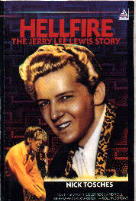 The basic word on this—as a perusal of practically any edition's blurbs will attest—is "Best Rock Bio Evah." I think the Boston Phoenix may have actually got closer to the heart of the matter: "To call Hellfire the best book written about a rock 'n' roller is to miss the point.... Hellfire is a rock 'n' roll event." I'm not here to argue with anyone about this—no one can deny that this is a remarkable book, a marriage made in ... some place fantastic ... between its subject Jerry Lee Lewis and biographer Nick Tosches. In general, not enough is understood about the religious convictions of some of the key figures in that first wave of rock 'n' roll and their beliefs in the basics of sin and redemption: thinking here specifically of Elvis, Little Richard, and Jerry Lee Lewis, the subject at hand, who once famously (or maybe not so famously) shut down a recording of "Great Balls of Fire" to argue the metaphysics, epistemology, and orthodoxy of the song with producer Sam Phillips. "How can the Devil save souls?" Lewis cried at one point. Tosches, a painstaking fact chaser, probably doesn't have the problems associated with this conflict, but he understands it. He understands the sources of those beliefs, and most importantly, he understands the language in which they are expressed. His book will make you laugh out loud at them. It will also chill you to your core.
The basic word on this—as a perusal of practically any edition's blurbs will attest—is "Best Rock Bio Evah." I think the Boston Phoenix may have actually got closer to the heart of the matter: "To call Hellfire the best book written about a rock 'n' roller is to miss the point.... Hellfire is a rock 'n' roll event." I'm not here to argue with anyone about this—no one can deny that this is a remarkable book, a marriage made in ... some place fantastic ... between its subject Jerry Lee Lewis and biographer Nick Tosches. In general, not enough is understood about the religious convictions of some of the key figures in that first wave of rock 'n' roll and their beliefs in the basics of sin and redemption: thinking here specifically of Elvis, Little Richard, and Jerry Lee Lewis, the subject at hand, who once famously (or maybe not so famously) shut down a recording of "Great Balls of Fire" to argue the metaphysics, epistemology, and orthodoxy of the song with producer Sam Phillips. "How can the Devil save souls?" Lewis cried at one point. Tosches, a painstaking fact chaser, probably doesn't have the problems associated with this conflict, but he understands it. He understands the sources of those beliefs, and most importantly, he understands the language in which they are expressed. His book will make you laugh out loud at them. It will also chill you to your core.In case it's not at the library.
Thursday, October 18, 2007
Blank Generation (1977)
 "Love Comes in Spurts" Welcome to 1977. While most partisans may claim Never Mind the Bollocks as the year's signature album (or, another crowd, The Clash), for me this is it and nothing else comes close. Containing just about the totality of Richard Hell (nee Meyers) songs—certainly the majority of what mattered, shortly before he teetered off into heroin-induced irrelevance—this thing explodes with energy and the kind of shrapnel that stays in your head for good, marking the ground zero of punk-rock. It hardly matters that such unpunk exercises as a bizarre, sludgy eight-minute workout ("Another World") and none other than a Creedence Clearwater Revival cover ("Walking on the Water") occur here. What does matter is Richard Hell's words and his sensibility and, even more and too often overlooked, the amazing guitar playing of Robert Quine, a lawyer who went on to become a New York City session man nonpareil, chipping in brilliant work with Lydia Lunch, Material, Lou Reed, Marianne Faithfull, on and on. Everything you need to know about this album and its moment is scrawled across Hell's chest on the original vinyl LP cover: "You make me _______."
"Love Comes in Spurts" Welcome to 1977. While most partisans may claim Never Mind the Bollocks as the year's signature album (or, another crowd, The Clash), for me this is it and nothing else comes close. Containing just about the totality of Richard Hell (nee Meyers) songs—certainly the majority of what mattered, shortly before he teetered off into heroin-induced irrelevance—this thing explodes with energy and the kind of shrapnel that stays in your head for good, marking the ground zero of punk-rock. It hardly matters that such unpunk exercises as a bizarre, sludgy eight-minute workout ("Another World") and none other than a Creedence Clearwater Revival cover ("Walking on the Water") occur here. What does matter is Richard Hell's words and his sensibility and, even more and too often overlooked, the amazing guitar playing of Robert Quine, a lawyer who went on to become a New York City session man nonpareil, chipping in brilliant work with Lydia Lunch, Material, Lou Reed, Marianne Faithfull, on and on. Everything you need to know about this album and its moment is scrawled across Hell's chest on the original vinyl LP cover: "You make me _______."..::THE-ROADHOUSE®::..
Another hard disk adequacy warning and this time I really, really mean it. This blog aggregates postings found via search of mostly classic rock, including generous portions of bootlegs and boxes. One of the specialties is discographies (or big sections of one) in a single download, and/or giant lists of links devoted to a single artist (sometimes a single artist) in one post—currently on the front page are Tom Petty, UFO, the Allman Brothers, and Yes. That front page is huge and deep too—and dates back only two days. Really, it's almost too much, not the least bit organized, and often overwhelming. But if you have the stamina, you can wander for hours and days here.
See more great music blogs.
Monday, October 15, 2007
Rumours (1977)
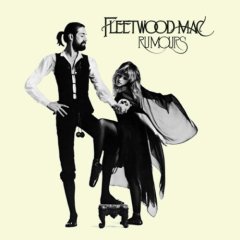 It's 30 years later and this album still resides comfortably in the top 20 list of all-time album sellers, reason enough for many (in fairness, myself included with some cases, e.g., Celine Dion, Dirty Dancing, Alanis Morissette, Boston, Garth Brooks, Boyz II Men, etc., etc.) to dismiss it. But this is the primary vault of Fleetwood Mac hits—"Go Your Own Way," "Dreams," "Don't Stop," "You Make Loving Fun"—and if you don't like at least one of them, well, all right. This is also where Lindsey Buckingham's pop production smarts/sensibility, not to mention an impressively squealing guitar in the sundry breaks, really start to step out. Stevie Nicks contributes another knockout punch in "Dreams." And that rhythm section is still kicking ass all over London and southern California. All respect to lovers of Brit blues, but comparing this to Peter Green's projects is like comparing Saturday Night Fever to Odessa, or Nevermind to Bleach. Things change; sales happen. It doesn't necessarily mean it's for the worse. I know what you say.
It's 30 years later and this album still resides comfortably in the top 20 list of all-time album sellers, reason enough for many (in fairness, myself included with some cases, e.g., Celine Dion, Dirty Dancing, Alanis Morissette, Boston, Garth Brooks, Boyz II Men, etc., etc.) to dismiss it. But this is the primary vault of Fleetwood Mac hits—"Go Your Own Way," "Dreams," "Don't Stop," "You Make Loving Fun"—and if you don't like at least one of them, well, all right. This is also where Lindsey Buckingham's pop production smarts/sensibility, not to mention an impressively squealing guitar in the sundry breaks, really start to step out. Stevie Nicks contributes another knockout punch in "Dreams." And that rhythm section is still kicking ass all over London and southern California. All respect to lovers of Brit blues, but comparing this to Peter Green's projects is like comparing Saturday Night Fever to Odessa, or Nevermind to Bleach. Things change; sales happen. It doesn't necessarily mean it's for the worse. I know what you say.More information in comments.
Sunday, October 14, 2007
Les Liaisons Dangereuses (1782)
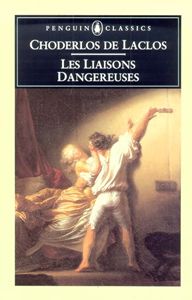 My introduction to this came via the Glenn Close/John Malkovich Hollywood vehicle of 1988, which I enjoyed. (I understand the Milos Forman-directed version that came out a year later, Valmont, is even better, but I haven't seen it.) But only recently did I read the novel they were based on, by 18th-century France one hit wonder Choderlos de Laclos, having turned it up at a garage sale. I'm never too excited by 18th-century European novels, even less so when I discovered the epistolary nature of this one—a bunch of letters written to one another by (in my expectation) a cast of overdressed, funny talking, wooden figure characters. Once into it, however, I was pleasantly surprised by the brisk and canny plotting and by the pithy, elegant language (1961 translation by P.W.K. Stone). By the time I was halfway in I was convinced it had to be an elaborate hoax published closer to 1982 than 1782. It is heartless, sexy, unpleasant, sweeping, gorgeous, and as believable as it is deeply cynical about human nature. The Publisher's Note, Editor's Preface, and scattered footnotes throughout provide meta-meditations on the "veracity" of the unfolding events and are probably what made me think it belongs more properly to postmodern Western civ than pre-Revolutionary France. More fool me. This is a good one.
My introduction to this came via the Glenn Close/John Malkovich Hollywood vehicle of 1988, which I enjoyed. (I understand the Milos Forman-directed version that came out a year later, Valmont, is even better, but I haven't seen it.) But only recently did I read the novel they were based on, by 18th-century France one hit wonder Choderlos de Laclos, having turned it up at a garage sale. I'm never too excited by 18th-century European novels, even less so when I discovered the epistolary nature of this one—a bunch of letters written to one another by (in my expectation) a cast of overdressed, funny talking, wooden figure characters. Once into it, however, I was pleasantly surprised by the brisk and canny plotting and by the pithy, elegant language (1961 translation by P.W.K. Stone). By the time I was halfway in I was convinced it had to be an elaborate hoax published closer to 1982 than 1782. It is heartless, sexy, unpleasant, sweeping, gorgeous, and as believable as it is deeply cynical about human nature. The Publisher's Note, Editor's Preface, and scattered footnotes throughout provide meta-meditations on the "veracity" of the unfolding events and are probably what made me think it belongs more properly to postmodern Western civ than pre-Revolutionary France. More fool me. This is a good one.In case it's not at the library.
Saturday, October 13, 2007
Fleetwood Mac (1975)
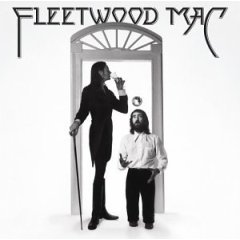 Peter Gabriel named his first four solo albums Peter Gabriel. Royal Trux named their first and third albums Royal Trux. So if this is the second Fleetwood Mac album named Fleetwood Mac (the first, in the era of Peter Green, was their first; this one is their 10th or so) it's not as if that isn't without precedent. Self-title also turned out to be perhaps more appropriate than anyone would have guessed, as it ushered in the era of Lindsey Buckingham and Stevie Nicks, who arguably overhauled the band more than any other pair of players passing through, and brought the world more or less a whole new Fleetwood Mac. This is a stone goodie, bearing some of their best-known, and best, hits: "Over My Head," "Say You Love Me," and the redoubtable "Rhiannon," one of the greatest of all '70s pop songs and which heralded the unmistakable sound—often repeated, rarely matched—of the gauzy Stevie Nicks. Not to mention "Warm Ways," a Bob Welchesque throwback by Christine McVie (my favorite Fleetwood Mac—who is yours?). Oh, and the rhythm section is solid too.
Peter Gabriel named his first four solo albums Peter Gabriel. Royal Trux named their first and third albums Royal Trux. So if this is the second Fleetwood Mac album named Fleetwood Mac (the first, in the era of Peter Green, was their first; this one is their 10th or so) it's not as if that isn't without precedent. Self-title also turned out to be perhaps more appropriate than anyone would have guessed, as it ushered in the era of Lindsey Buckingham and Stevie Nicks, who arguably overhauled the band more than any other pair of players passing through, and brought the world more or less a whole new Fleetwood Mac. This is a stone goodie, bearing some of their best-known, and best, hits: "Over My Head," "Say You Love Me," and the redoubtable "Rhiannon," one of the greatest of all '70s pop songs and which heralded the unmistakable sound—often repeated, rarely matched—of the gauzy Stevie Nicks. Not to mention "Warm Ways," a Bob Welchesque throwback by Christine McVie (my favorite Fleetwood Mac—who is yours?). Oh, and the rhythm section is solid too.(Special thanks to RE-UPPED!)
Wednesday, October 10, 2007
Back at the Chicken Shack (1960)
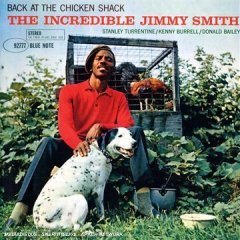 Admittedly, most of the stuff I post here I am long familiar with, and it is old. This is a slightly different case—old, but relatively new to me. In fact, there are large swaths of jazz unknown to me. This, from Blue Note, with Smith playing Hammond B-3 organ, Kenny Burrell guitar, and Stanley Turrentine tenor sax, is a whole new kind of all-day jazz to me—the kind that doesn't focus practically exclusively on saxophone and/or Miles Davis. It's a pure delight, warm and deceptively laidback and full of nice moments and little surprises. As for once again offering old music, I can only repeat a version of what Bob Dylan said once on his radio show. I don't have anything against new music, but there's a lot more old music than new. P.S. I want that dog on the cover.
Admittedly, most of the stuff I post here I am long familiar with, and it is old. This is a slightly different case—old, but relatively new to me. In fact, there are large swaths of jazz unknown to me. This, from Blue Note, with Smith playing Hammond B-3 organ, Kenny Burrell guitar, and Stanley Turrentine tenor sax, is a whole new kind of all-day jazz to me—the kind that doesn't focus practically exclusively on saxophone and/or Miles Davis. It's a pure delight, warm and deceptively laidback and full of nice moments and little surprises. As for once again offering old music, I can only repeat a version of what Bob Dylan said once on his radio show. I don't have anything against new music, but there's a lot more old music than new. P.S. I want that dog on the cover.
Sunday, October 07, 2007
Imperial Bedroom (1982)
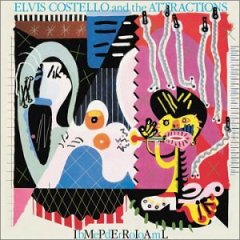 At which point all agreement about Elvis Costello came to an end. Those inclined to label him with figures they perceived that he intended to ape (Buddy Holly for My Aim Is True, Bob Dylan for This Year's Model, so on and so forth) claimed Cole Porter, George Gershwin, even no less than all of Tin Pin Alley for this. Dean Robert Christgau flew in the face of the consensus of the time that this was not only good, but great, pooh-poohing that it "shores up my impression that he can be precious lyrically, vocally, and musically, and gnomic for no reason at all--in short, pretentious." Well, the rest of us liked it pretty well, although I admit this was the beginning of Elvis Costello albums that required, at least for me, a certain attitude and approach of practically reverent study. Typically, little makes sense for the first several listens, then various melodies, lyrical phrases, breaks and other kicks begin to emerge and cohere, until finally, 15 or so listens in, the gorgeous wide-screen tapestry is evident in all its splendor. For me, this experience has been fairly consistent across most of the body of his work that followed, which puts even the work I most enthusiastically endorse squarely in the camp of music I am most suspicious of – the kind you "have to listen to a few times" before their genius discloses. In other words, self-fulfilling prophecy. Even so, that's my thumb pointing straight to heaven on this one.
At which point all agreement about Elvis Costello came to an end. Those inclined to label him with figures they perceived that he intended to ape (Buddy Holly for My Aim Is True, Bob Dylan for This Year's Model, so on and so forth) claimed Cole Porter, George Gershwin, even no less than all of Tin Pin Alley for this. Dean Robert Christgau flew in the face of the consensus of the time that this was not only good, but great, pooh-poohing that it "shores up my impression that he can be precious lyrically, vocally, and musically, and gnomic for no reason at all--in short, pretentious." Well, the rest of us liked it pretty well, although I admit this was the beginning of Elvis Costello albums that required, at least for me, a certain attitude and approach of practically reverent study. Typically, little makes sense for the first several listens, then various melodies, lyrical phrases, breaks and other kicks begin to emerge and cohere, until finally, 15 or so listens in, the gorgeous wide-screen tapestry is evident in all its splendor. For me, this experience has been fairly consistent across most of the body of his work that followed, which puts even the work I most enthusiastically endorse squarely in the camp of music I am most suspicious of – the kind you "have to listen to a few times" before their genius discloses. In other words, self-fulfilling prophecy. Even so, that's my thumb pointing straight to heaven on this one.
The Sound and the Fury (1929)
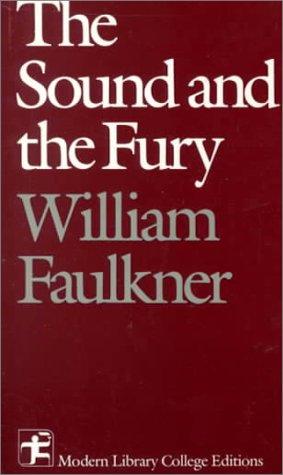 Perhaps one of the more interesting and telling points about the critical reception of William Faulkner is the wide variation and lack of consensus found in assessing any single "masterpiece"—this one gets the nod frequently, perhaps even most, but close behind it are Absalom, Absalom!; As I Lay Dying; and Light in August, not to mention the rest of the oeuvre, including a fat tome of stories, all well worth looking into. But this remains my favorite, in spite of all the effort and patience required to make it through the first of the four sections, the one that develops the "tale told by an idiot" part of the Shakespeare quote that engendered the title. As opaque as it generally is, it contains information essential to what follows, as the inevitable second reading of the whole really proves. In the sections that follow I find inspired sources and foreshadowings of J.D. Salinger, Jim Thompson, and Cormac McCarthy, respectively. Sure, it's all a bit melodramatic (strike that "bit"), but Faulkner plunges joyfully in language, meaning, and mood like a dog in a lake on a hot summer day; the pleasures and associations unfold and unfold and unfold.
Perhaps one of the more interesting and telling points about the critical reception of William Faulkner is the wide variation and lack of consensus found in assessing any single "masterpiece"—this one gets the nod frequently, perhaps even most, but close behind it are Absalom, Absalom!; As I Lay Dying; and Light in August, not to mention the rest of the oeuvre, including a fat tome of stories, all well worth looking into. But this remains my favorite, in spite of all the effort and patience required to make it through the first of the four sections, the one that develops the "tale told by an idiot" part of the Shakespeare quote that engendered the title. As opaque as it generally is, it contains information essential to what follows, as the inevitable second reading of the whole really proves. In the sections that follow I find inspired sources and foreshadowings of J.D. Salinger, Jim Thompson, and Cormac McCarthy, respectively. Sure, it's all a bit melodramatic (strike that "bit"), but Faulkner plunges joyfully in language, meaning, and mood like a dog in a lake on a hot summer day; the pleasures and associations unfold and unfold and unfold.In case it's not at the library.
Friday, October 05, 2007
Get Happy!! (1980)
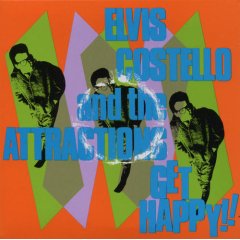 "Love for Tender" With this semi-alleged (and semi-denied) gesture of quasi-apology, exhaustion in Elvis Costello from the furious pace of the previous two or three years was arguably beginning to show. That was evidenced most painfully by the unduly famous 1979 encounter in a Columbus, Ohio, bar between Costello, on the one hand, and Bonnie Bramlett and Stephen Stills on the other. In the conversation, Costello reportedly referred to James Brown and Ray Charles with a nasty name that starts with "N." Bramlett and Stills ran to the press with it. Me, I never doubted that Elvis meant it only as a blow-off gesture to two sorry figures of the '60s on the downslope of their careers incapable of understanding punk-rock and all that it engendered. He was probably tired and didn't feel like talking to them. They probably didn't get the hint. So goes my take. Unfortunately the rock establishment of the time—who held Bramlett and Stills in higher esteem than Costello (looking at you, Rolling Stone)—went ahead and set the whole thing up as a public cage match between hippies and punks, too busy expressing their disdain for one another to see how much they have in common. They should have brought in Allen Ginsberg to fight for the beats and been done with it. The damage was severe. Three years later and beyond Costello, no racist, was still apologizing for it. He's probably still apologizing for it even today. This album was part and parcel of all that, intentionally or otherwise, with its many paeans to Motown, Stax, and all points soul. It's also one of his best albums, as rich and generous as anything he had released yet. Go ahead and live with it for a month or two. You won't regret.
"Love for Tender" With this semi-alleged (and semi-denied) gesture of quasi-apology, exhaustion in Elvis Costello from the furious pace of the previous two or three years was arguably beginning to show. That was evidenced most painfully by the unduly famous 1979 encounter in a Columbus, Ohio, bar between Costello, on the one hand, and Bonnie Bramlett and Stephen Stills on the other. In the conversation, Costello reportedly referred to James Brown and Ray Charles with a nasty name that starts with "N." Bramlett and Stills ran to the press with it. Me, I never doubted that Elvis meant it only as a blow-off gesture to two sorry figures of the '60s on the downslope of their careers incapable of understanding punk-rock and all that it engendered. He was probably tired and didn't feel like talking to them. They probably didn't get the hint. So goes my take. Unfortunately the rock establishment of the time—who held Bramlett and Stills in higher esteem than Costello (looking at you, Rolling Stone)—went ahead and set the whole thing up as a public cage match between hippies and punks, too busy expressing their disdain for one another to see how much they have in common. They should have brought in Allen Ginsberg to fight for the beats and been done with it. The damage was severe. Three years later and beyond Costello, no racist, was still apologizing for it. He's probably still apologizing for it even today. This album was part and parcel of all that, intentionally or otherwise, with its many paeans to Motown, Stax, and all points soul. It's also one of his best albums, as rich and generous as anything he had released yet. Go ahead and live with it for a month or two. You won't regret.Thursday, October 04, 2007
motel de moka
As Herr K. of Totally Fuzzy once expressed it, sometimes nothing but the hand-picked, well-chosen single mp3 audio track will do. When that is the case, this site is worth making your first stop. Contributors, from a staff of a dozen or so, offer (as the spirit moves) a mix of a dozen or so tracks, each of which may be downloaded individually. Selections typically run toward the ambient, lengthy, and/or dance-inflected, but very nice pop and even oldies offerings show up as well. Tracks available for a limited time.
See more great music blogs.
Wednesday, October 03, 2007
Armed Forces (1979)
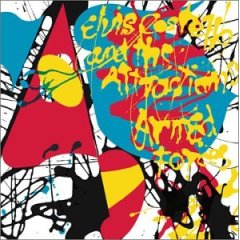 Oh, I just don't know where to begin. With this, Elvis Costello's third release in less than a year and a half, each one equally fully packed and with barely a shred of filler, the dimensions of his talent were starting to come clear. On vinyl, either side constituted a complete experience, and—not to go all cliché on you—it was like taking a roller coaster ride that followed each set of sudden dips, turns, and shrieks with, not a braking cruise back to the starting point, but another climb to greater heights. He pulled rabbits out of hats and then he pulled hats out of rabbits. Depths of reference peeled back to reveal more depths of reference, and repeated listening was rewarded with sustained and increasing pleasure. This could get to be a daily habit that lasted weeks, even months. He wasn't Buddy Holly. He wasn't Bob Dylan. Lord knows he wasn't ABBA. But he could have been all of them, parading around inside the skin of a wonky nebbish. It was impossible to guess how he was doing it. Best just to shut up and listen.
Oh, I just don't know where to begin. With this, Elvis Costello's third release in less than a year and a half, each one equally fully packed and with barely a shred of filler, the dimensions of his talent were starting to come clear. On vinyl, either side constituted a complete experience, and—not to go all cliché on you—it was like taking a roller coaster ride that followed each set of sudden dips, turns, and shrieks with, not a braking cruise back to the starting point, but another climb to greater heights. He pulled rabbits out of hats and then he pulled hats out of rabbits. Depths of reference peeled back to reveal more depths of reference, and repeated listening was rewarded with sustained and increasing pleasure. This could get to be a daily habit that lasted weeks, even months. He wasn't Buddy Holly. He wasn't Bob Dylan. Lord knows he wasn't ABBA. But he could have been all of them, parading around inside the skin of a wonky nebbish. It was impossible to guess how he was doing it. Best just to shut up and listen.
Monday, October 01, 2007
This Year's Model (1978)
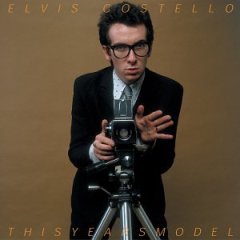 You hear a lot of talk about sophomore curses, but Elvis Costello (& the Attractions) blew that to smithereens with this stunning follow-up to his promising debut, My Aim Is True. Every move of brash confidence is made good (for example, the titles; it was, and this is). It's tempting to make the comparison with Neil Young re: Crazy Horse and the Attractions. Herr Costello is simply better with his house band as the ferocious attack here first amply demonstrated. But this also exhibited songwriting chops on the first step of a stairway to heaven that would last at least another four years—and, arguably, more than ten. He lived and breathed rock 'n' roll history (the musical references to the Stones, Bob Dylan, and many more come fast and furious here), he was genuinely pissed off (about everything), and by all evidence he never slept. Just cranked out one knotty, brilliant number after the next. Get on board. This is where the fun starts.
You hear a lot of talk about sophomore curses, but Elvis Costello (& the Attractions) blew that to smithereens with this stunning follow-up to his promising debut, My Aim Is True. Every move of brash confidence is made good (for example, the titles; it was, and this is). It's tempting to make the comparison with Neil Young re: Crazy Horse and the Attractions. Herr Costello is simply better with his house band as the ferocious attack here first amply demonstrated. But this also exhibited songwriting chops on the first step of a stairway to heaven that would last at least another four years—and, arguably, more than ten. He lived and breathed rock 'n' roll history (the musical references to the Stones, Bob Dylan, and many more come fast and furious here), he was genuinely pissed off (about everything), and by all evidence he never slept. Just cranked out one knotty, brilliant number after the next. Get on board. This is where the fun starts.
Sunday, September 30, 2007
A Hell of a Woman (1954)
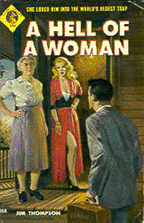 Jim Thompson wrote a lot of crap and a handful of masterpieces, all of them, of either persuasion, slim and (mostly) compulsively readable volumes. In general, I find The Killer Inside Me overrated, The Getaway underrated, and A Hell of a Woman the best of the bunch. The misogyny is perfectly unpleasant, the language strong and straightforward and direct from the vernacular, and the plotting meticulous enough to ensure that the atomization of the ending was deliberate, and hardly the result of an exhausted writer who couldn't think of anything else to do with his story. Despite the ubiquitous labels, Thompson's work cannot fairly be called "suspense," "thriller," "mystery," or any similar genre. "Post-Depression American Psychosis"—yeah, there, that's the ticket. "Depression" referring to both the personal/emotional and the historical/economic disasters. We shouldn't, after all, forget that Thompson was a native of Oklahoma who died in Los Angeles.
Jim Thompson wrote a lot of crap and a handful of masterpieces, all of them, of either persuasion, slim and (mostly) compulsively readable volumes. In general, I find The Killer Inside Me overrated, The Getaway underrated, and A Hell of a Woman the best of the bunch. The misogyny is perfectly unpleasant, the language strong and straightforward and direct from the vernacular, and the plotting meticulous enough to ensure that the atomization of the ending was deliberate, and hardly the result of an exhausted writer who couldn't think of anything else to do with his story. Despite the ubiquitous labels, Thompson's work cannot fairly be called "suspense," "thriller," "mystery," or any similar genre. "Post-Depression American Psychosis"—yeah, there, that's the ticket. "Depression" referring to both the personal/emotional and the historical/economic disasters. We shouldn't, after all, forget that Thompson was a native of Oklahoma who died in Los Angeles.In case it's not at the library.
Friday, September 28, 2007
James Brown
 009 James Brown
009 James Brownlisted shortest to longest...
James Brown, "Cold Sweat [w/ Dialogue]" (1967) (0:23)
James Brown, "Hold It (Instrumental)" (1958) (1:24)
James Brown, "I Cried" (1958) Featuring Tammi Terrell, then known as Tammy Montgomery. (1:53)
James Brown, "No, No, No, No" (1958) (1:55)
. . .
James Brown, "For Goodness Sakes Look at Those Cakes" (11:33)
James Brown, "Mind Power" (1973) (12:03)
James Brown, "Time Is Running Out Fast" (1973) (12:46)
James Brown, "Escape-Ism (Complete Take)" (1971) (19:09)
More information in comments.
Tuesday, September 25, 2007
Sleeps With Angels (1994)
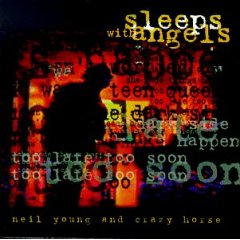 It's hard to imagine what it must have felt like for Neil Young to hear Kurt Cobain's suicide note close with his own incoherent denim koan of some 15 years earlier—"better to burn out than to fade away." Particularly as Young & crew's recent and most spectacular return to form paralleled the rise of grunge, even giving a helpful hand to Sonic Youth as opening act on the Weld tour, just as Sonic Youth in turn gave a helpful hand to Nirvana in getting signed to DGC. It's all balled up there. Neil Young stood even more in the crosshairs of history than he knew on that one. I've heard a lot of people dismiss this as journeyman '90s Neil Young, over the hump and on the down slope from his recent heights. But "Change Your Mind" alone belies that to me, 14+ minutes of deceptively amiable anguish that deploys all the sonic extremes of grunge, from a whisper to a scream as it were, delivered in fine Young/Crazy Horse fashion, whose overarching theme is the request to reconsider. There are plenty of missteps along the way, but even if it's the least of them, this is one of the keepers by Young.
It's hard to imagine what it must have felt like for Neil Young to hear Kurt Cobain's suicide note close with his own incoherent denim koan of some 15 years earlier—"better to burn out than to fade away." Particularly as Young & crew's recent and most spectacular return to form paralleled the rise of grunge, even giving a helpful hand to Sonic Youth as opening act on the Weld tour, just as Sonic Youth in turn gave a helpful hand to Nirvana in getting signed to DGC. It's all balled up there. Neil Young stood even more in the crosshairs of history than he knew on that one. I've heard a lot of people dismiss this as journeyman '90s Neil Young, over the hump and on the down slope from his recent heights. But "Change Your Mind" alone belies that to me, 14+ minutes of deceptively amiable anguish that deploys all the sonic extremes of grunge, from a whisper to a scream as it were, delivered in fine Young/Crazy Horse fashion, whose overarching theme is the request to reconsider. There are plenty of missteps along the way, but even if it's the least of them, this is one of the keepers by Young.
Sunday, September 23, 2007
Rust Never Sleeps (1979)
I've already nominated After the Gold Rush as my sense of the best Neil Young album (with or without Crazy Horse, and of course allowing for the ridiculousness of such judgments) so I can't say that about this one. But even with weak tracks and/or moments here and there among its nine songs ("Welfare Mothers") this is an awfully close second. No other rock artist has come so close to nailing the experience of the U.S. Civil War as Young does here in "Powderfinger" – not bad for a Canadian, not bad for a history lesson. (N.b., so it seems to me. I wasn't there. I can only speak for the amazing power of it, which has repeatedly set me to bawling.) Ditto "Pocahontas" re: that American legend. Elvis Presley and Johnny Rotten also make brief appearances here that ring with veracity and authority. In short, perhaps no one at the time understood better the moment in history in which he existed. And that's just talking about the lyrics. The music? It's Neil Young and Crazy Horse in peak form. What else do you want to know?
Friday, September 21, 2007
Tonight's the Night (1975)
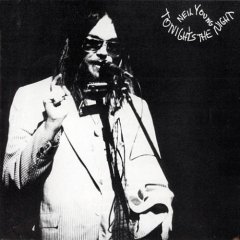 By design, this is an exceedingly dark album. The original gatefold vinyl LP was black inside and out, including the Reprise label itself, normally orange. Based on Neil Young's visceral reaction to three separate drug-related deaths in Crazy Horse and their road crew, some have gone so far as to call it anti-drug, which I suppose is fair enough, but a little bit of a stretch for someone who lives inside a marijuana cloud (not, in the interests of avoiding the appearance of hypocrisy, that there's anything wrong with that). More than anything it's a wail of pain, and the first of many abrupt revitalizations that would come to be a feature of Young's career. It's sloppy, loud, plain-spoken to the point of homely, self-indulgent, self-pitying, and often unlistenable. But when the mood suits – and that mood has more to do with Neil Young and Crazy Horse generally, rather than anything you might guess, like depression, sadness, or being bummed out – nothing else will do.
By design, this is an exceedingly dark album. The original gatefold vinyl LP was black inside and out, including the Reprise label itself, normally orange. Based on Neil Young's visceral reaction to three separate drug-related deaths in Crazy Horse and their road crew, some have gone so far as to call it anti-drug, which I suppose is fair enough, but a little bit of a stretch for someone who lives inside a marijuana cloud (not, in the interests of avoiding the appearance of hypocrisy, that there's anything wrong with that). More than anything it's a wail of pain, and the first of many abrupt revitalizations that would come to be a feature of Young's career. It's sloppy, loud, plain-spoken to the point of homely, self-indulgent, self-pitying, and often unlistenable. But when the mood suits – and that mood has more to do with Neil Young and Crazy Horse generally, rather than anything you might guess, like depression, sadness, or being bummed out – nothing else will do.
Thursday, September 20, 2007
Zinhof
One of the first (at least to me) and still one of the best, Zinhof at one time seemed to be everywhere at once, with boxes, new releases, and an endless stream of goodies. Now more or less confined only to the latter, the focus leans toward classic rock with a blues streak a mile wide. The selections are choice, knowledgeable, and always worth the benefit of the doubt. Mostly full albums available indefinitely, with some bootlegs, hand-picked track mixes, and pointers to dexes. Archives worth browsing, but last time I checked the trolls still move fast here.
See more great music blogs.
Wednesday, September 19, 2007
After the Gold Rush (1970)
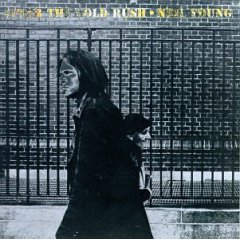 Ah, more high school memories. In this case, the debate centered on the quality of Neil Young's voice. Everyone agreed, however grudgingly, that there was something amazing about Young and his songwriting. But many – including myself, I'm sorry to say now – couldn't handle the turns of high-pitched wheedling. "I just can't stand that voice," our ignorance spoke to eternity. Two decades later I would hear the same argument applied to actress Rosie Perez, but even by then I was well over it or anything like it. This is where so much begins and exists for all time with Neil Young. If I had to pick only one of his many, many albums to pack for the proverbial desert island this would likely be it. His songwriting is rarely so strong track to track – everything, even the two clocking in at less than two minutes, is perfectly realized, and the typical division for him between folkie and hard rocker is rarely so hard to draw. Not to mention other divisions along the lines of melody master, politically outraged spokesperson for a generation, and man of disaffected alienation. It's all here, and it just doesn't get much better than this.
Ah, more high school memories. In this case, the debate centered on the quality of Neil Young's voice. Everyone agreed, however grudgingly, that there was something amazing about Young and his songwriting. But many – including myself, I'm sorry to say now – couldn't handle the turns of high-pitched wheedling. "I just can't stand that voice," our ignorance spoke to eternity. Two decades later I would hear the same argument applied to actress Rosie Perez, but even by then I was well over it or anything like it. This is where so much begins and exists for all time with Neil Young. If I had to pick only one of his many, many albums to pack for the proverbial desert island this would likely be it. His songwriting is rarely so strong track to track – everything, even the two clocking in at less than two minutes, is perfectly realized, and the typical division for him between folkie and hard rocker is rarely so hard to draw. Not to mention other divisions along the lines of melody master, politically outraged spokesperson for a generation, and man of disaffected alienation. It's all here, and it just doesn't get much better than this.
Monday, September 17, 2007
Everybody Knows This Is Nowhere (1969)
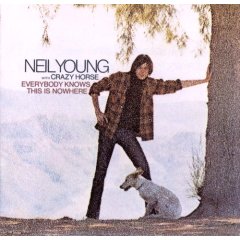 Some things probably everybody knows: 1) Neil Young is good, but Neil Young with Crazy Horse is usually better. This is the first album by Neil Young with Crazy Horse, and includes such signature career classics as "Cinnamon Girl," "Down by the River," and "Cowgirl in the Sand." 2) Neil Young tends to work best in collaboration, whether it's Crazy Horse, Crosby, Stills &/or Nash, Emmylou Harris, or whoever. His first band, the Mynah Birds, was fronted by fellow Canadian Rick James. (Yes, that Rick James.) 3) Neil Young is a folkie with the capacity to rock harder than practically any other gentle strummer of an acoustic guitar. He's also wily in his effectiveness, viz., "Down by the River," in which at one point Young plays the same note some 43 times consecutively. One of the greatest guitar solos ever. 4) People routinely claim this as one of the great rock albums. Others say it's the greatest. I'm not about to get in anybody's way on this, but listen, there's no question, this is a really good one.
Some things probably everybody knows: 1) Neil Young is good, but Neil Young with Crazy Horse is usually better. This is the first album by Neil Young with Crazy Horse, and includes such signature career classics as "Cinnamon Girl," "Down by the River," and "Cowgirl in the Sand." 2) Neil Young tends to work best in collaboration, whether it's Crazy Horse, Crosby, Stills &/or Nash, Emmylou Harris, or whoever. His first band, the Mynah Birds, was fronted by fellow Canadian Rick James. (Yes, that Rick James.) 3) Neil Young is a folkie with the capacity to rock harder than practically any other gentle strummer of an acoustic guitar. He's also wily in his effectiveness, viz., "Down by the River," in which at one point Young plays the same note some 43 times consecutively. One of the greatest guitar solos ever. 4) People routinely claim this as one of the great rock albums. Others say it's the greatest. I'm not about to get in anybody's way on this, but listen, there's no question, this is a really good one.
Friday, September 14, 2007
Live Through This (1994)
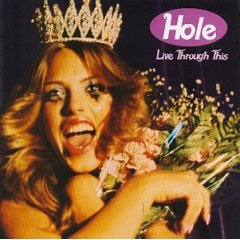 All these years later and I'm still not exactly sure what to think of this, the only album by Hole that matters. At one time I took the side of Courtney Love – call it the sympathy vote – but in light of the band's skimpy follow-ons I have since, grudgingly, come to believe the insinuations about Kurt Cobain having a much, much bigger hand here than he is officially credited for. Not that this is a bunch of Nirvana songs he wrote and threw to the object of his love and hatred, only that he was heavily involved, with an enmeshment that has the density of a Lennon/McCartney collaboration, one of those where it's hard to know where one author ends and the other begins. That's one of the bitches of a primary relationship. One of many. I'm happy to give the nod to Love for the calibrated choice of Young Marble Giants cover, "Credit in the Straight World," the gratuitously bizarre denigration of all things Olympia, Washington, the various passages of shrieking and throaty caterwauling, along with putting the band together in the first place and supplying all the drive and ambition, that being hardly the least significant piece of the proceedings here. The imagery of milk and other bodily functions related to baby-having came from them both – a fascination for which being one of those things they shared. Everything else has something (or everything) of Cobain to it – all the riffs, licks, hooks, and sundry dynamics of sound. Hate Courtney Love as you will. I can't say I think much of her myself. But this album is as much testimony to Cobain's love for her as the timing of his suicide was testimony to his hate. You just can't pick it apart. There's the rub. It's frozen in time that way.
All these years later and I'm still not exactly sure what to think of this, the only album by Hole that matters. At one time I took the side of Courtney Love – call it the sympathy vote – but in light of the band's skimpy follow-ons I have since, grudgingly, come to believe the insinuations about Kurt Cobain having a much, much bigger hand here than he is officially credited for. Not that this is a bunch of Nirvana songs he wrote and threw to the object of his love and hatred, only that he was heavily involved, with an enmeshment that has the density of a Lennon/McCartney collaboration, one of those where it's hard to know where one author ends and the other begins. That's one of the bitches of a primary relationship. One of many. I'm happy to give the nod to Love for the calibrated choice of Young Marble Giants cover, "Credit in the Straight World," the gratuitously bizarre denigration of all things Olympia, Washington, the various passages of shrieking and throaty caterwauling, along with putting the band together in the first place and supplying all the drive and ambition, that being hardly the least significant piece of the proceedings here. The imagery of milk and other bodily functions related to baby-having came from them both – a fascination for which being one of those things they shared. Everything else has something (or everything) of Cobain to it – all the riffs, licks, hooks, and sundry dynamics of sound. Hate Courtney Love as you will. I can't say I think much of her myself. But this album is as much testimony to Cobain's love for her as the timing of his suicide was testimony to his hate. You just can't pick it apart. There's the rub. It's frozen in time that way.
Tuesday, September 11, 2007
Midnite Vultures (1999)
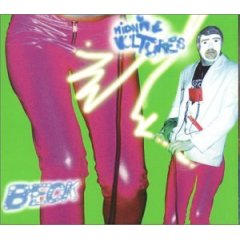 In which Beck seems to evince the idea that the '70s was all about sex and Kraftwerk. Just guessing here. Whatever he is about on this outing, it remains my favorite album from him. Sure, it's just plain wrong-headed when you try to add up all the elements. The charm doesn't fit the sleaze that oozes from every pore, and vice versa. Subject and object rarely find the verb to make their relationship work. There are too many ampersands in the titles. And what happened to the jokes? (Please don't tell me Scientology.) So my recommendation: Don't try to add up all the elements. Play this only where there is adequate space for dancing. Power down the brain and any instinct for rational analysis. There's no other way to do it. But there is pleasure waiting for you on the other side.
In which Beck seems to evince the idea that the '70s was all about sex and Kraftwerk. Just guessing here. Whatever he is about on this outing, it remains my favorite album from him. Sure, it's just plain wrong-headed when you try to add up all the elements. The charm doesn't fit the sleaze that oozes from every pore, and vice versa. Subject and object rarely find the verb to make their relationship work. There are too many ampersands in the titles. And what happened to the jokes? (Please don't tell me Scientology.) So my recommendation: Don't try to add up all the elements. Play this only where there is adequate space for dancing. Power down the brain and any instinct for rational analysis. There's no other way to do it. But there is pleasure waiting for you on the other side.
Sunday, September 09, 2007
Odelay (1996)
 Beck first came to the attention of the world at large with the inescapable hit "Loser" in 1994, arguably enough anthem for a generation particularly coming as it did just when Kurt Cobain had retired from everything. Yet, as auspicious as it was, the promise of "Loser" was not delivered on until this album more than two years later. (Most people would probably agree that the erraticism would become a hallmark of his career, even if they wouldn't agree on what's an up and what a down.) Teaming with L.A. producers the Dust Brothers, Beck & co. mix up a rich stew of lo-fi recordings, samples, found sound, skronk, squawk, hard drumming and fine guitar both electric and acoustic, all underpinned by confident songwriting and some pretty good jokes. The same things that made "Loser" so great, in short. For a long time, except for "Jack-Ass," I thought this was basically overrated – it was everybody's #1 with a bullet at the time. But the years have been surprisingly kind to it for me and now, 11 years on, it sounds better every time I play it.
Beck first came to the attention of the world at large with the inescapable hit "Loser" in 1994, arguably enough anthem for a generation particularly coming as it did just when Kurt Cobain had retired from everything. Yet, as auspicious as it was, the promise of "Loser" was not delivered on until this album more than two years later. (Most people would probably agree that the erraticism would become a hallmark of his career, even if they wouldn't agree on what's an up and what a down.) Teaming with L.A. producers the Dust Brothers, Beck & co. mix up a rich stew of lo-fi recordings, samples, found sound, skronk, squawk, hard drumming and fine guitar both electric and acoustic, all underpinned by confident songwriting and some pretty good jokes. The same things that made "Loser" so great, in short. For a long time, except for "Jack-Ass," I thought this was basically overrated – it was everybody's #1 with a bullet at the time. But the years have been surprisingly kind to it for me and now, 11 years on, it sounds better every time I play it.
Thursday, September 06, 2007
Car Wheels on a Gravel Road (1998)
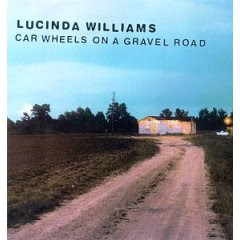 Lucinda Williams's fourth album in 18 years (in fairness, she stepped up the pace after this) was the one that finally brought her to my attention (and the world's), the result for me of randomly happening to hear "Right in Time" on the car radio, one of those sit-bolt-upright and got to know what the hell that was experiences. Having since plowed through the oeuvre past present and future I think there's no denying she's something special. There's a lot of drunkenness in her material, a lot of southern wrack and ruin, and her appreciation for the chosen objects of her affection – Paul Westerberg, X, and rock critics in general, to name a few – often take me by surprise. She's country to her bone. But she's an awful lot more as well. This is as good a primer as any.
Lucinda Williams's fourth album in 18 years (in fairness, she stepped up the pace after this) was the one that finally brought her to my attention (and the world's), the result for me of randomly happening to hear "Right in Time" on the car radio, one of those sit-bolt-upright and got to know what the hell that was experiences. Having since plowed through the oeuvre past present and future I think there's no denying she's something special. There's a lot of drunkenness in her material, a lot of southern wrack and ruin, and her appreciation for the chosen objects of her affection – Paul Westerberg, X, and rock critics in general, to name a few – often take me by surprise. She's country to her bone. But she's an awful lot more as well. This is as good a primer as any.
Dead End
Dead End, perhaps needless to say, is anything but. Operating at the point where classic ('70s) rock shades into fusion shades into eternity, it offers near-discographies of names both familiar to me (Who, Focus, Emerson, Lake & Palmer, 1969 Woodstock festival, Electric Light Orchestra, King Crimson) and unfamiliar (Eloy, Dream Theater, Le Orme, Spock's Beard, Porcupine Tree), which is a good way to help a poor slob like me branch out and try something new. Operative concept: "I know, it's only rock 'n' roll. But I like it."
See more great music blogs.
Monday, September 03, 2007
The Contino Sessions (1999)
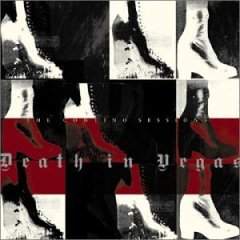 Death in Vegas—duo Richard Fearless and Tim Holmes + sidemen, following the departure of co-founder Steve Helier—muscled up for this follow-up to the debut. More rock, less electronica. More band, less studio. Old saying, however: you can take the Brit out of the electronica, but you can't take the electronica out of the Brit. Thus the boop-bip-bip meandering remains, but a nice variety of ominous, doomy texture more often make the various proceedings spooky, alluring, and occasionally thrilling. The all-star cavalcade of guest artists are due no small amount of credit: Dot Allison ("Dirge"), Bobby Gillespie ("Soul Auctioneer"), Jim Reid ("Broken Little Sister"), and Iggy Pop ("Aisha"). I could do without the serial killer shtick, but it's always nice to hear someone make good use of Iggy.
Death in Vegas—duo Richard Fearless and Tim Holmes + sidemen, following the departure of co-founder Steve Helier—muscled up for this follow-up to the debut. More rock, less electronica. More band, less studio. Old saying, however: you can take the Brit out of the electronica, but you can't take the electronica out of the Brit. Thus the boop-bip-bip meandering remains, but a nice variety of ominous, doomy texture more often make the various proceedings spooky, alluring, and occasionally thrilling. The all-star cavalcade of guest artists are due no small amount of credit: Dot Allison ("Dirge"), Bobby Gillespie ("Soul Auctioneer"), Jim Reid ("Broken Little Sister"), and Iggy Pop ("Aisha"). I could do without the serial killer shtick, but it's always nice to hear someone make good use of Iggy.
Saturday, September 01, 2007
Dead Elvis (1997)
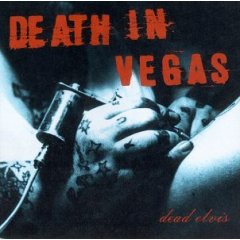 Death in Vegas spun out of Britain's trip hop maelstrom of the mid-'90s, the band calling itself Dead Elvis until pressure from the Presley estate forced them to use the name only for the debut album (even that no doubt a gesture of defiance) and move it along from there. "Dirt," which samples a hilariously self-important announcement from the stage of the 1969 Woodstock festival, comes on like one of those booming, overpoweringly infectious Chemical Brothers tracks. But the rest of the album is relatively sedate, leaning toward the dense, rich atmospherics of dub, with little touches of jazz and slightly larger touches of techno or electronica sprinkled in. While a good deal of this album wanders aimlessly, it never retires entirely into the background. Put it on when guests are over and someone sooner or later is bound to ask what it is.
Death in Vegas spun out of Britain's trip hop maelstrom of the mid-'90s, the band calling itself Dead Elvis until pressure from the Presley estate forced them to use the name only for the debut album (even that no doubt a gesture of defiance) and move it along from there. "Dirt," which samples a hilariously self-important announcement from the stage of the 1969 Woodstock festival, comes on like one of those booming, overpoweringly infectious Chemical Brothers tracks. But the rest of the album is relatively sedate, leaning toward the dense, rich atmospherics of dub, with little touches of jazz and slightly larger touches of techno or electronica sprinkled in. While a good deal of this album wanders aimlessly, it never retires entirely into the background. Put it on when guests are over and someone sooner or later is bound to ask what it is.
Wednesday, August 29, 2007
"Heroes" (1977)
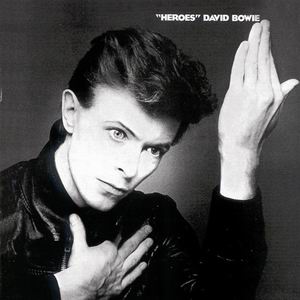 With this, his second release of 1977, it became evident how good Berlin and Brian Eno were turning out to be for David Bowie. Arguably the weakest of the Germany-based trilogy, with a meandering, often unfocused second side of experimental soundscapes, and a not wholly stellar first side of essays at the pop song, somehow none of those points matter. Operating on pure instinct, the whole here simply transcends the sum of its parts and it's hard to be much more articulate about it than that. "Beauty and the Beast" is a perfectly overwrought confection that sets the tone for the first side; ditto "V-2 Schneider" for the second; and whoever thought of hauling in Robert Fripp (drunk, according to some reports) for guitar honors on the title song – itself a perfectly overwrought confection – deserves a medal. As does Fripp. As do Bowie and Eno. So medals all around – always appropriate for "heroes." Don't miss the prescience of the album closer, "The Secret Life of Arabia."
With this, his second release of 1977, it became evident how good Berlin and Brian Eno were turning out to be for David Bowie. Arguably the weakest of the Germany-based trilogy, with a meandering, often unfocused second side of experimental soundscapes, and a not wholly stellar first side of essays at the pop song, somehow none of those points matter. Operating on pure instinct, the whole here simply transcends the sum of its parts and it's hard to be much more articulate about it than that. "Beauty and the Beast" is a perfectly overwrought confection that sets the tone for the first side; ditto "V-2 Schneider" for the second; and whoever thought of hauling in Robert Fripp (drunk, according to some reports) for guitar honors on the title song – itself a perfectly overwrought confection – deserves a medal. As does Fripp. As do Bowie and Eno. So medals all around – always appropriate for "heroes." Don't miss the prescience of the album closer, "The Secret Life of Arabia."
Sunday, August 26, 2007
Labour of Lust (1979)
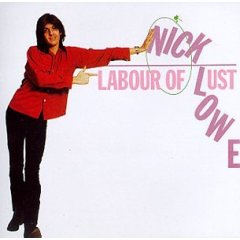 "American Squirm" Nick Lowe's one and only U.S. chart hit comes from this, but nothing here, not even that hit "Cruel to Be Kind," is really up to any of the coulda woulda shoulda gems on his audacious debut, at least not in terms of technicolor pop chutzpah. Still, I think I might like this album more. The country influences that led him in part to temporarily become Johnny Cash's stepson-in-law are more pronounced, the songs generally quirkier, more subtle, and dare I say sensitive. "Big Kick, Plain Scrap" is a showcase for drummer Terry Williams, "Switchboard Susan" all groaner puns, "You Make Me" tender as a bruise. Personnel on most of the songs here amounts to Rockpile, the band Lowe formed with Dave Edmunds. "American Squirm" features the Attractions and Declan MacManus himself singing background. A nice set.
"American Squirm" Nick Lowe's one and only U.S. chart hit comes from this, but nothing here, not even that hit "Cruel to Be Kind," is really up to any of the coulda woulda shoulda gems on his audacious debut, at least not in terms of technicolor pop chutzpah. Still, I think I might like this album more. The country influences that led him in part to temporarily become Johnny Cash's stepson-in-law are more pronounced, the songs generally quirkier, more subtle, and dare I say sensitive. "Big Kick, Plain Scrap" is a showcase for drummer Terry Williams, "Switchboard Susan" all groaner puns, "You Make Me" tender as a bruise. Personnel on most of the songs here amounts to Rockpile, the band Lowe formed with Dave Edmunds. "American Squirm" features the Attractions and Declan MacManus himself singing background. A nice set.
Subscribe to:
Posts (Atom)

